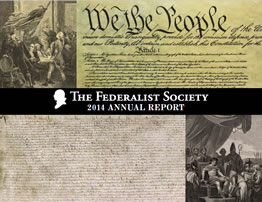2014 Annual Report

The Federalist Society enjoyed great success in 2014. This past year has seen the creation and launching of many new initiatives, as well as the achievement of new milestones in our foundational programs. Our Student Chapters are flourishing; they are the strongest extracurricular groups at a majority of the top 20 law schools, as well as many others around the country. Although law school enrollment has declined, our attendance numbers remain high for the well over a thousand events with guest speakers that our chapters feature every year. Such an achievement is indicative of a genuine desire for the serious exchange of ideas.
In addition to student programs, demand for our programming has risen in every division across the board. We have increased our program offerings in order to meet this demand, enabling lawyers all over the country to come together and deepen their knowledge of the Constitution through debate and discussion. This past winter, the Society co-sponsored an exhibition of Magna Carta at the Library of Congress to commemorate the 800th anniversary of the first issue of Magna Carta. The exhibit detailed Magna Carta’s impact on the understanding of individual liberty throughout the centuries.
The Federalist Society is also launching a new initiative; our Article One Project. The objective is to provide an explanatory theory of Congress and its role within the three branches as envisioned by the Framers. It is clearly established in the Federalist Papers that the drafters of the Constitution intended the legislature to be the most powerful branch of government. In its present form, most would say it is not. We are left to wonder how this came to be the case. Were the Founders simply wrong about the inherent powers of the legislative branch? The Federalist Society will enlist leading experts to flesh out a theory of what role Congress should play in the American political process. In particular, we are focusing on how a theory of Congress would inform our understanding of the core constitutional arrangements of the separation of powers, bicameralism, enumerated powers, the federal system in our extended republic, and the limitations imposed by the Bill of Rights.
Of course, with the president’s very aggressive use of executive power, the Federalist Society has, and will continue to examine, the appropriate constitutional limits on that power.
We believe the principles this nation was founded upon—that the state exists to preserve freedom, that the separation of powers is central to our Constitution, and that it is emphatically the province and duty of the judiciary to say what the law is, not what it should be— are essential for a free society. The Federalist Society’s mission is to ensure that these principles are heard and discussed. We have pursued that goal ever since our founding in 1982.
Our success is the direct result of your support and efforts, and for that we are grateful.
Sincerely,
![]()
Eugene B. Meyer
President

